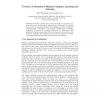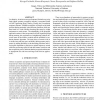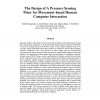3031 search results - page 4 / 607 » Investigating human-computer optimization |
110
click to vote
ACL
1998
15 years 3 months ago
1998
Miscommunication in speech recognition systems is unavoidable, but a detailed characterization of user corrections will enable speech systems to identify when a correction is taki...
105
click to vote
BEHAVIOURIT
2004
15 years 2 months ago
2004
The extent to which memory for information content is reliable, trustworthy, and accurate is crucial in the information age. Being forced to divert attention to interrupting messag...
152
click to vote
ITS
1998
Springer
15 years 6 months ago
1998
Springer
We define a learning tutor as being an intelligent agent that learns from human tutors and then tutors human learners. The notion of a learning tutor provides a conceptual framewor...
141
click to vote
WIAMIS
2009
IEEE
15 years 9 months ago
2009
IEEE
An adaptive, invariant to user performance fluctuation or noisy input signal, gesture recognition scheme is presented based on Self Organizing Maps, Markov Models and Levenshtein...
136
click to vote
EUROSSC
2007
Springer
15 years 8 months ago
2007
Springer
This paper addresses the design of a large area, high resolution, networked pressure sensing floor with primary application in movement-based human-computer interaction (M-HCI). T...



